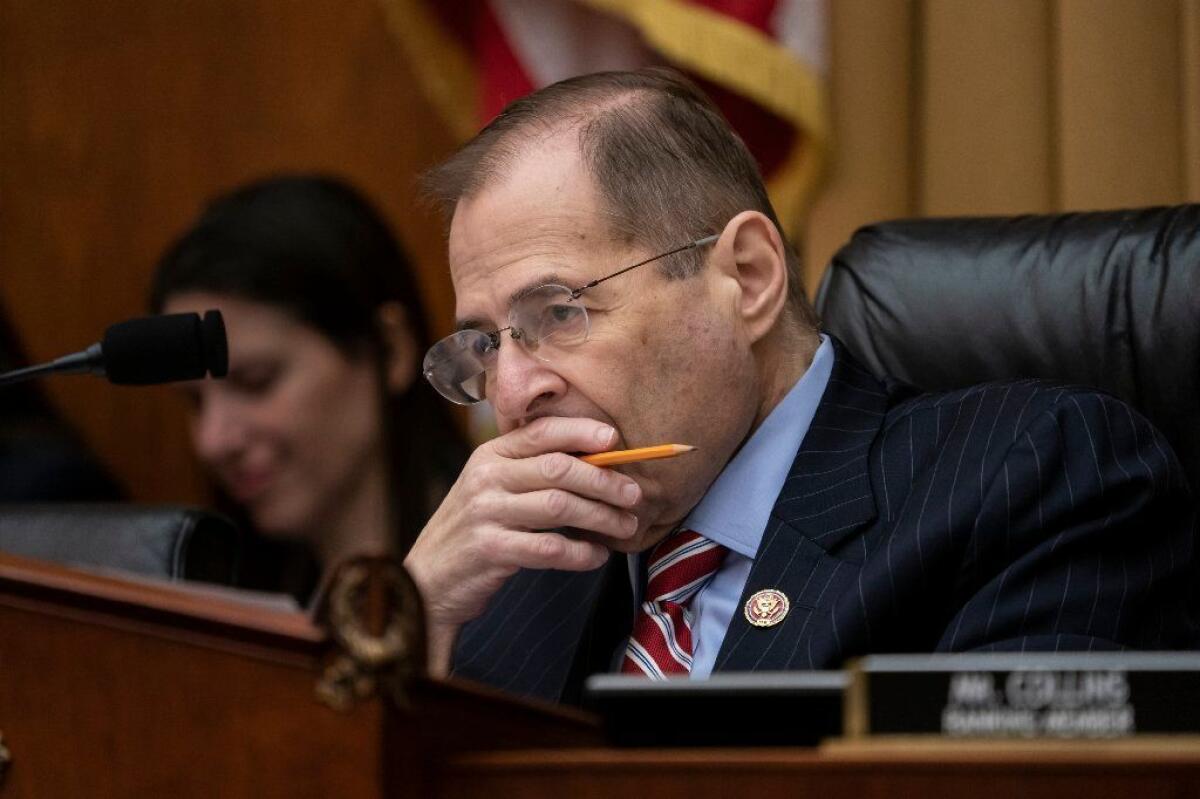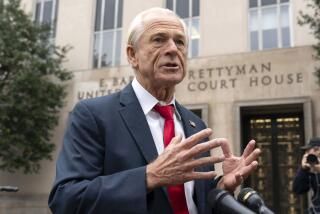White House stiff-arms House Judiciary Committee on Russia investigation
The White House hardened its opposition to House Democrats’ investigations on Wednesday, telling lawmakers that they had no authority to examine how President Trump has wielded his executive power.
The stance stiffens Trump’s already obdurate approach toward Capitol Hill, and it represents an expansive view of how presidents can stonewall congressional requests for documents or testimony from administration officials.
“The Committee’s inquiries transparently amount to little more than an attempt to duplicate — and supplant — law enforcement inquiries, and apparently to do so simply because the actual law enforcement investigations conducted by the Department of Justice did not reach a conclusion favored by some members of the Committee,” Pat Cipollone, the top White House lawyer, wrote in a letter to Rep. Jerrold Nadler, the New York Democrat who chairs the House Judiciary Committee.
The argument paralleled one that Trump’s personal lawyers made this week in court in an effort to block subpoenas of Trump’s financial records. They also argued that Congress could not pursue investigations that replicated “law enforcement” inquiries. The federal judge appeared skeptical of the argument, saying that such a rule would have blocked congressional investigations of the Watergate scandal.
House Democrats have been trying to build on the Russia investigation led by special counsel Robert S. Mueller III by probing whether Trump obstructed justice or otherwise abused his power. But the White House has refused to cooperate on that inquiry or in others into the president’s tax returns and the granting of security clearances.
“Based on the sheer number and scope of the Committee’s requests, it is clear that the Committee is trying to unduly burden the Office of the President so as to impair the President’s ability to carry out his constitutional duties,” Cipollone’s letter said. “The Constitution does not permit Congress to undermine the President in this manner.”

In his 448-page report, Mueller laid out several instances in which Trump tried to impede the Russia investigation. However, he did not reach a conclusion on whether Trump violated the law — in part because Justice Department rules prevent sitting presidents from being indicted.
Atty. Gen. William Barr and then-Deputy Atty. Gen. Rod Rosenstein said the evidence did not show that Trump committed a crime. With the special counsel’s investigation over, the White House accused Democrats of trying to repeat Mueller’s work without a legitimate purpose.
“Congressional investigations are intended to obtain information to aid in evaluating potential legislation, not to harass political opponents or to pursue an unauthorized ‘do-over’ of exhaustive law enforcement investigations conducted by the Department of Justice,” Cipollone wrote.
Nadler responded by telling reporters that the White House was trying to make the president invulnerable to any kind of oversight.
“They say the Justice Department can’t hold him accountable since a sitting president can’t be indicted,” he said. “Now they’re saying the Congress can’t hold a president accountable. This is ridiculous. It would make the president above the law.”
Nadler said Democrats may seek “very large” fines against people held in contempt of Congress for failing to comply with subpoenas. The House Judiciary Committee has already recommended contempt for Barr for refusing to provide lawmakers with an unredacted copy of the Mueller report and its underlying evidence, but the matter has not yet reached the House floor.
Democratic congressional leaders have suggested that more administration officials could face contempt. The House may hold one vote on all of them together next month.
Nadler said Democrats will not be deterred from pursuing their investigations, which include taking testimony from Mueller and Donald McGahn, Trump’s first White House counsel and a key witness. Trump has said neither should testify.
“We will subpoena whoever we have to subpoena,” Nadler said. “We will hear from Mueller. We will hear from McGahn. We will hear from a lot of other witnesses. We will hold in contempt whoever doesn’t comply with subpoenas.”
Nadler’s political opponents have sharply criticized his leadership. Rep. Doug Collins of Georgia, the top Republican on the House Judiciary Committee, said that the panel “has become a parody.”
“When the results of Robert Mueller’s investigation did not satisfy Democrats, they quickly started peddling to the American people a manufactured ‘constitutional crisis,’” he said.
Wednesday’s letter is only one way in which Trump has resisted congressional inquiries. The president made a preliminary assertion of executive privilege over the unredacted Mueller report and the underlying evidence. The decision allows his team more time to review the materials before making a more definitive assessment.
The legal principle of executive privilege allows presidents to keep secret their communications with advisors, and the Russia investigation relied heavily on prosecutors’ interviews with White House aides.
Times staff writers Jennifer Haberkorn, Eli Stokols and Sarah D. Wire in Washington contributed to this report.
More to Read
Get the L.A. Times Politics newsletter
Deeply reported insights into legislation, politics and policy from Sacramento, Washington and beyond. In your inbox three times per week.
You may occasionally receive promotional content from the Los Angeles Times.







